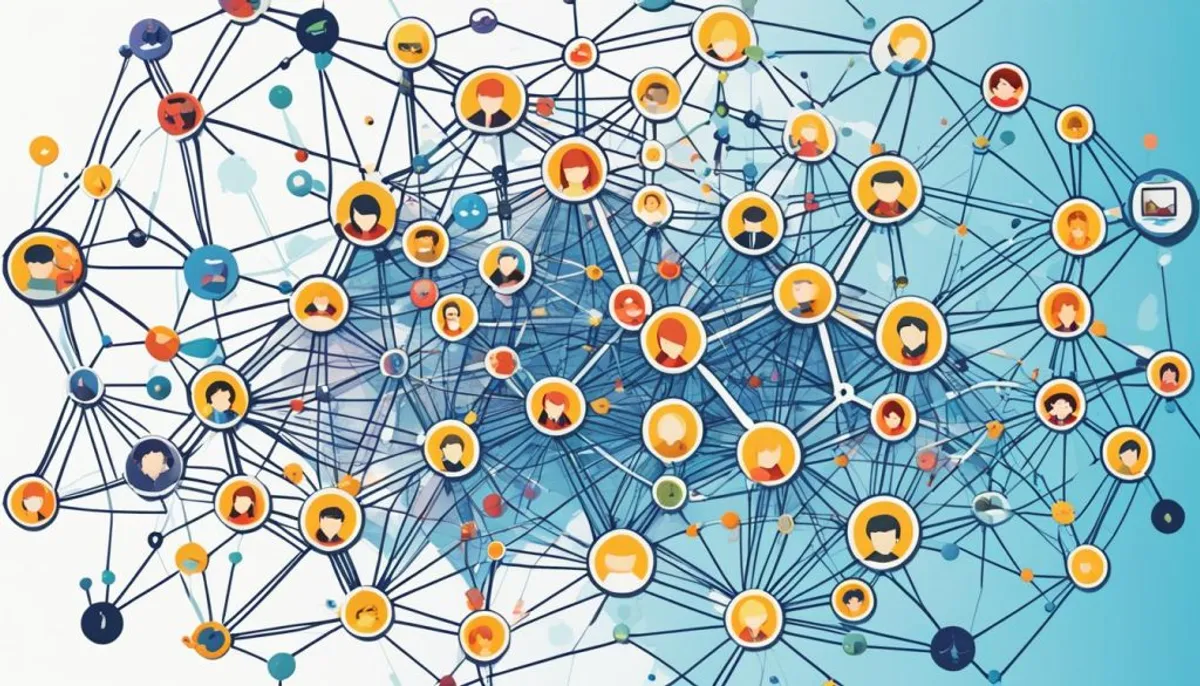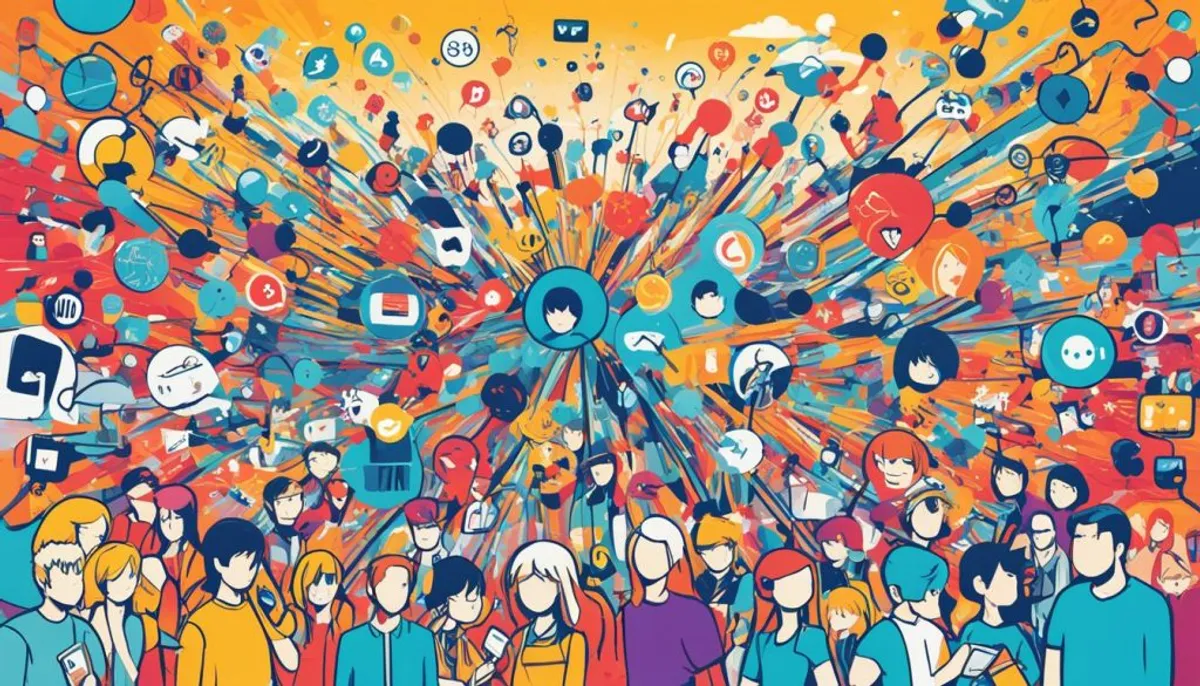Social networks have transformed how we connect, communicate, and share today. They have a massive user base totaling 4.74 billion globally. This makes social networking a worldwide trend that brings people together, no matter where they are. In particular, social media trends japan are shaping the way users interact and engage with content.
When we discuss social networks, we mean websites and apps for building profiles and making friends online. They let us share our lives, views, and photos or videos with others. It’s all about staying connected and making new friends.
There are many kinds of social networks for different purposes. You find big names like Facebook, Twitter, and Instagram for daily sharing. For work and professional growth, there’s LinkedIn. So, there’s something for everyone.
To understand their impact, we need to know how social networks work. They use smart tech and the internet to let us talk and share instantly, enhancing our ability to connect with others and showcase our rizz. This overcomes the limits of time and distance, bringing people closer.
In this article, we dive into social networks, exploring what they are, how they work, and their types. We’ll also look at their role in connecting us, their benefits and downsides in personal and business use, and effective user engagement strategies that can enhance interaction on these platforms.

Key Takeaways:
- Social networks are websites and apps that facilitate connections, communication, and information sharing among users.
- Social networks have over 4.74 billion users worldwide, making them an integral part of our digital landscape.
- These platforms allow users to create profiles, form connections, and engage in various forms of communication.
- There are different types of social networks, catering to specific needs such as social connections, professional networking, and multimedia sharing.
- Social networks play a vital role in our society, fostering connections, facilitating learning, and providing marketing opportunities.
What is Social Networking?
Social networking is about websites and apps for connecting and sharing. It’s used for online chats and sharing info. People use PCs, tablets, or smartphones to visit these sites.
Social sites store and organize lots of data. They focus on what users post and share. Users can make profiles, connect with others, and see others’ content.
The first site, SixDegrees.com, started in 1997. Since then, social networking has grown fast, significantly contributing to information diffusion. By January 2022, over 4.74 billion people worldwide were using these networks.
How Do Social Networks Work?
Social networking sites use advanced technology and connect through the internet. People can join these platforms with their devices, bringing their unique rizz to the conversations. This lets them chat and share with others in many ways.
These sites have databases that keep everything organized with programming languages. You can post text, updates, and photos. You can also see and interact with what others share.
Connecting with others is easy too. You might hear it called “friending” or “following.” This helps you find and talk to people who share your interests. Social networks also suggest new friends and groups you might like, helping you make more connections.
Technology is key in how these platforms work. It helps users talk and share information online. Also, with effective video seo strategies, you can log on and view content from anywhere, thanks to the internet.
The databases and programming languages are really important. They keep the data well-organized and easy to find. Social networks, including bitchute video-sharing, give us the ways to share, connect, and chat. This makes an active and connected digital world.
Types of Social Networks
When it comes to social networking sites, there is a diverse range of platforms. They cater to specific needs and interests. Let’s explore some of the different types of social networks:
Social Connections Networks
These networks help users stay connected with friends, family, and people they know. Platforms like Facebook, Instagram, and Snapchat let users share updates, photos, and videos. This way, they keep in touch with their social circle, which is crucial for identity development in teens.
Professional Connections Networks
Designed for professionals, these networks help build business relationships and industry connections. LinkedIn is a prime example. It offers a space where individuals can display their skills, connect with colleagues, and look for job opportunities.
Sharing Multimedia Networks
These networks are all about sharing visual content, such as videos and photos. YouTube and Instagram stand out as places where users can show off their creative work. They also share personal moments and engage with others through visuals.
News or Informational Networks
These networks provide users with news stories and informational content. Platforms like Twitter and Reddit let users share and discuss news. They stay updated on current events and join conversations on various topics of interest.
Communication Networks
These networks make it easy for users to chat one-on-one or in groups. WhatsApp, Messenger, and Slack are key examples. They help with instant messaging and teamwork.
Educational Networks
Educational networks support online learning and collaboration among students, teachers, and educational bodies. Moodle and Edmodo offer virtual classrooms and online courses. They come with resources that boost learning.
These examples highlight the variety of social networks out there. Each type has a different focus and draws a particular group of users. You can pick platforms that match your interests and goals, including those with descriptive social network titles. This lets you connect with people who share your interests.
Now that we’ve explored the different types of social networks, let’s delve deeper. We’ll look into the importance of these platforms and their impact on society.
Importance of Social Networks
Social networks are vital in our lives today. They help us share, learn, and stay in touch. Also, they’re key for marketing. This makes social networks a big part of how we interact online.
They connect friends and family over distances. You can share news, photos, and video clips easily. These platforms make it simple to celebrate big moments together, no matter where you are.
Social networks are great for learning too. They give us news and updates fast. You can easily dive into topics you love, such as youtube art tutorials, and chat with others who share your interests.
For businesses, social networks are a game-changer. They boost brand awareness and help with engaging customers. Additionally, incorporating video seo can enhance the visibility of promotional content. Businesses can promote what they offer and reach more people than ever before.
These networks also help build communities. They connect people with similar interests or causes. It’s a space where folks can work together and impact society in good ways.
“Social networks bridge the gaps of time and distance, fostering relationships and keeping us connected.”
In conclusion, social networks are huge for us today. They help us keep in touch, learn new things, and share our lives. Both individuals and businesses gain a lot by tapping into social networks’ potential.

Benefits of Social Networking
Social networking is key for people and businesses today. It helps us connect, build relationships, and promote brands, including through educational networks. Here are the big ways it can help.
1. Brand Awareness:
Businesses use social networks to make more people aware of their brand. They make engaging content and talk to their audience, showcasing their rizz in communication. This helps them grow and have a strong online presence.
2. Instant Reachability:
Social networks remove barriers, letting people and businesses connect worldwide instantly. With a few clicks, you can share info with others, no matter where they are. This rapid information diffusion allows ideas and updates to spread quickly across the globe.
3. Building a Following:
Businesses can grow a loyal customer base on social networks. They keep providing good content and interacting. This way, they keep followers who really care about their products or services.
4. Positive Reviews and Comments:
Customers can leave good reviews and comments on social networking sites. This can really help a business’s reputation. It also influences what potential customers decide to buy.
5. Increased Website Traffic:
Businesses can get more people to visit their websites through social networks. They share links to their site, blog, products, or services. This leads users to learn more or buy something.
| Benefits of Social Networking: | |
|---|---|
| Brand Awareness | benefits of social networking |
| Instant Reachability | benefits of social networking |
| Building a Following | benefits of social networking |
| Positive Reviews and Comments | benefits of social networking |
| Increased Website Traffic | benefits of social networking |
But, social networking isn’t without its challenges. Rumors and lies can spread. Negative feedback can hurt a business. There are also worries about data security and privacy. Plus, keeping up with social media takes a lot of time. It’s key to face these issues wisely and use social networks the right way.
In the end, social networking’s good points outweigh its bad points. It’s a strong tool for making connections and talking to people worldwide. By using social networks well, individuals and businesses can boost their brand. They can find new customers and build strong relationships online.
Social Networks in Business
Social networks help businesses meet their audience and facilitate information diffusion. Many users flock to these platforms, making them key for business growth.
These networks earn by selling ads and promoted posts. They offer a great way for businesses to engage with their consumers. Plus, they’re a tool for customer research and marketing.
On these platforms, companies can directly interact with their audience. This builds a community around their brand. By talking to customers, businesses learn important info for ads, and they can also benefit from low-cost social media marketing services.
Some firms also use social networks internally. This boosts team spirit and helps employees work better together. These internal networks help with sharing knowledge and solving problems, facilitating information diffusion among team members.
Social networks let businesses talk directly to their audience. They’re great for making people aware of your brand. They also gather useful data for making big decisions.
| Benefits of Social Networks in Business | Challenges of Social Networks in Business |
|---|---|
|
|
Example:
“Social networks let our business connect deeply with our customers. We created a strong community around our brand. This boosted our brand’s recognition and customer loyalty. The data we got from social media helped us focus our marketing better and target our ads. Yet, handling our social media took a lot of work. We had to deal with negative feedback, keep customer data safe, and watch out for false info.”
– John Smith, CEO of XYZ Company
Using social networks in business brings big advantages, especially when leveraging social media marketing platforms india. But, companies must watch out for the downsides. They should plan carefully to avoid these risks.
Pros and Cons of Social Networking
Social networking sites are a big part of our lives today. They offer great chances for people and businesses. But, just like any tool, there are good and bad sides. Let’s look at the pros and cons to better understand social networking’s effects.
Advantages of Social Networking
Here are some ways social networking and educational networks help us grow personally and professionally:
- Brand Awareness: Social media helps businesses spread the word about their brand. It lets them reach more people and be more visible.
- Instant Reachability: Social networks let you reach people across the world quickly, without worrying about distance.
- Building a Following: People and businesses can attract a loyal audience. This is great for sharing content or products.
- Business Success: Social media is a useful tool for marketing, finding leads, and gaining customers. This helps businesses grow and succeed.
- Increased Website Traffic: Sharing links to websites on social media can bring more visitors and improve a business’s online presence.
Disadvantages of Social Networking
But social networking, including platforms like irc, also has downsides people need to know about:
- Rumors and Misinformation: Social media can quickly spread false information. This can hurt people and organizations.
- Negative Reviews and Comments: Bad feedback on social media can damage a company’s image and cause public backlash.
- Data Security and Privacy Concerns: Sharing too much personal info on social media raises the risk of data breaches and privacy violations.
- Time-Consuming: Being active on social media takes a lot of time, effort, and engagement. This can be hard for those with limited resources.
It’s important to look at both the good and bad sides of social networking. Then, come up with plans to handle the challenges. Knowing the benefits and risks can help users get the most from their social networking experience.
| Advantages | Disadvantages |
|---|---|
| Brand Awareness | Rumors and Misinformation |
| Instant Reachability | Negative Reviews and Comments |
| Building a Following | Data Security and Privacy Concerns |
| Business Success | Time-Consuming |
| Increased Website Traffic |

By considering the pros and cons, people and businesses can use strategies to use social networking well. For instance, engaging with youtube educational content for seniors can enhance learning and connection. By being informed, setting limits, and caring about privacy, it can be a great tool for connecting, growing, and achieving success.
Conclusion
Social networks have changed how we connect and communicate digitally. Platforms like Facebook, Instagram, and Twitter are now crucial. They let us share info, communicate, and market online.
These networks help us keep in touch with loved ones and support business connections. They use databases and programming to let us make profiles and connect. You can share and interact with content made by others.
While they offer big benefits, like making brands known and expanding reach, there are drawbacks. Issues like rumors, negative feedback, and privacy concerns can affect users and companies. But, by knowing the good and bad, we can use these platforms well.
In the end, social networks deeply affect our world. They help with communication and relationships. As we use these platforms more, it’s vital to be smart about it. This means enjoying the good parts and being aware of the risks. Doing this, we can make the most of social networking for both online and real-world connections.
FAQ
What is a social network?
A social network is a digital space where people can meet, talk, and share things. It’s a way to stay connected with others.
What are the types of social networks?
There are many kinds, like ones for friends, work, sharing photos, getting news, chatting, and learning, including educational networks.
How do social networks work?
They need the internet and gadgets. People make profiles, find friends, and see or share stuff.
What is the importance of social networks?
They help us bond, make friends, and shape our social life. They’re good for sharing news, learning, chatting, and even advertising.
What are the benefits of social networking?
Benefits include making your brand known, reaching people quickly, growing your followers, success in business, and more visitors to your website through effective video seo strategies.
How are social networks used in business?
Businesses use them to meet customers, learn what they like, interact, and spread the word about their products.
What are the pros and cons of social networking?
The good sides are making your brand famous, quick connections, gaining followers, winning in business, and more web traffic. The bad sides are false news, bad reviews, worries about data safety, and how much time it takes. Additionally, platforms like irc can contribute to both the benefits and drawbacks of online engagement.
RelatedRelated articles



